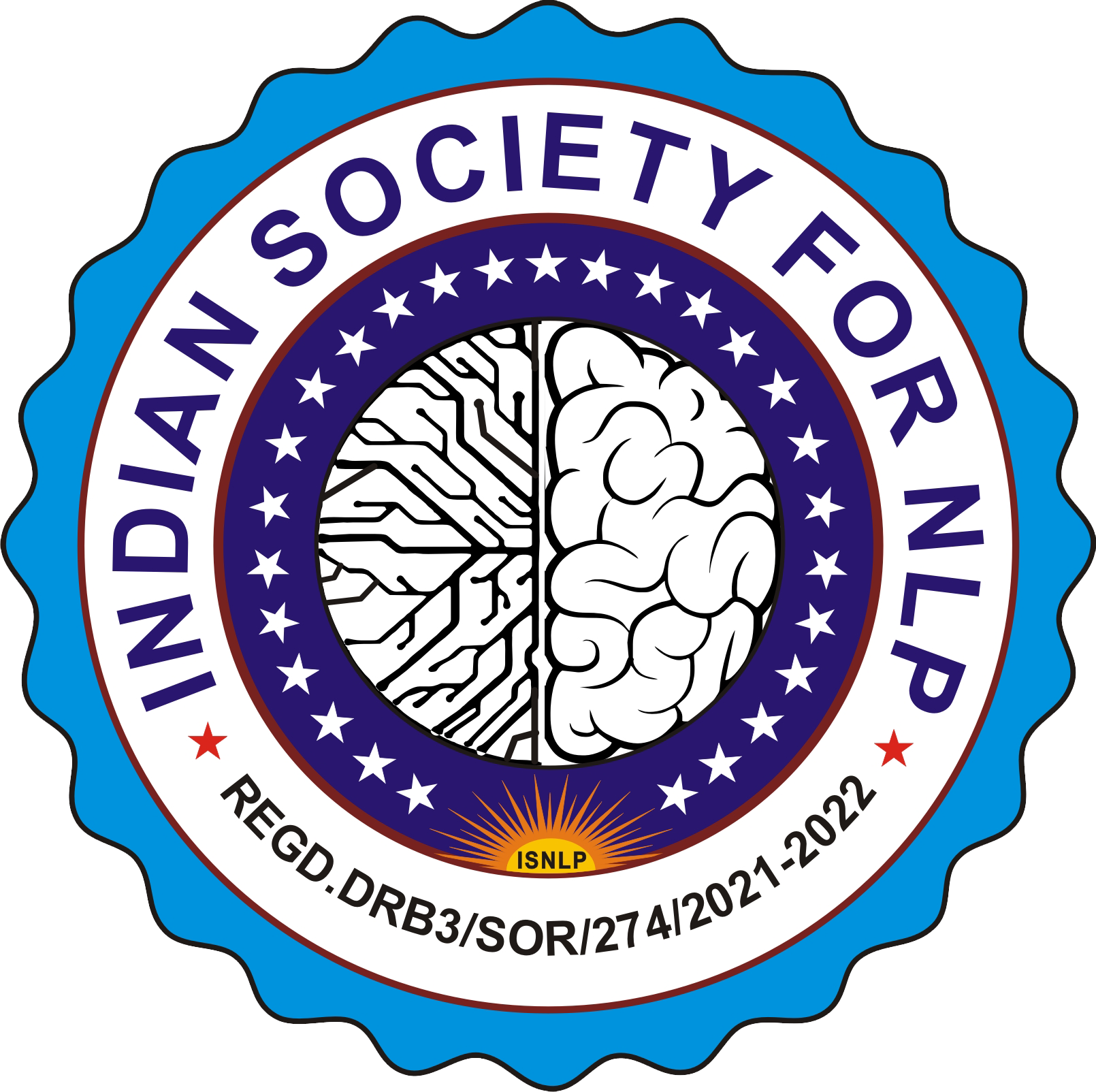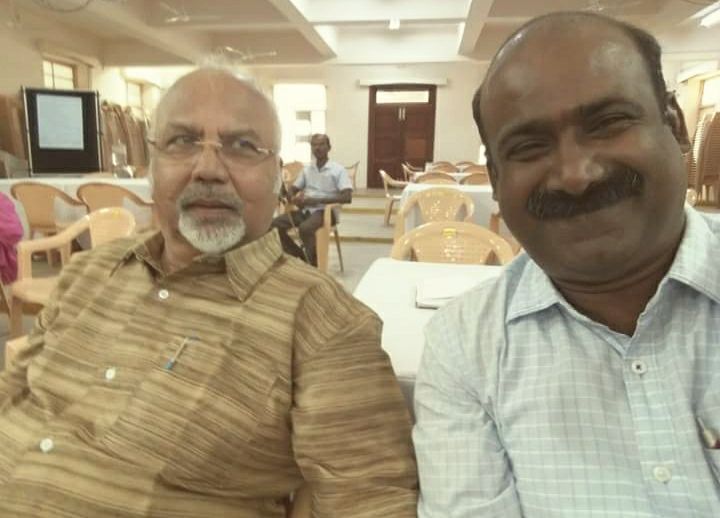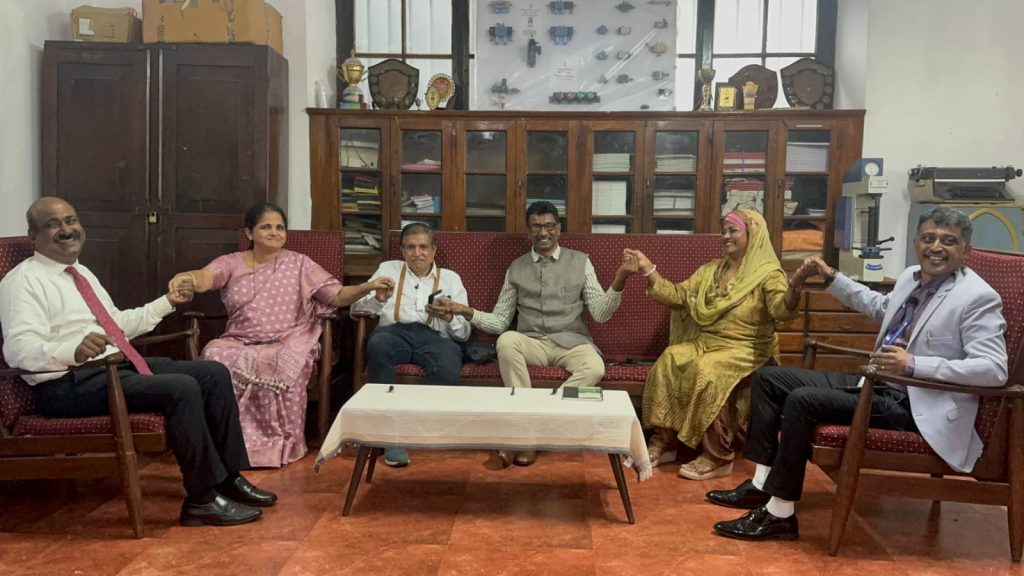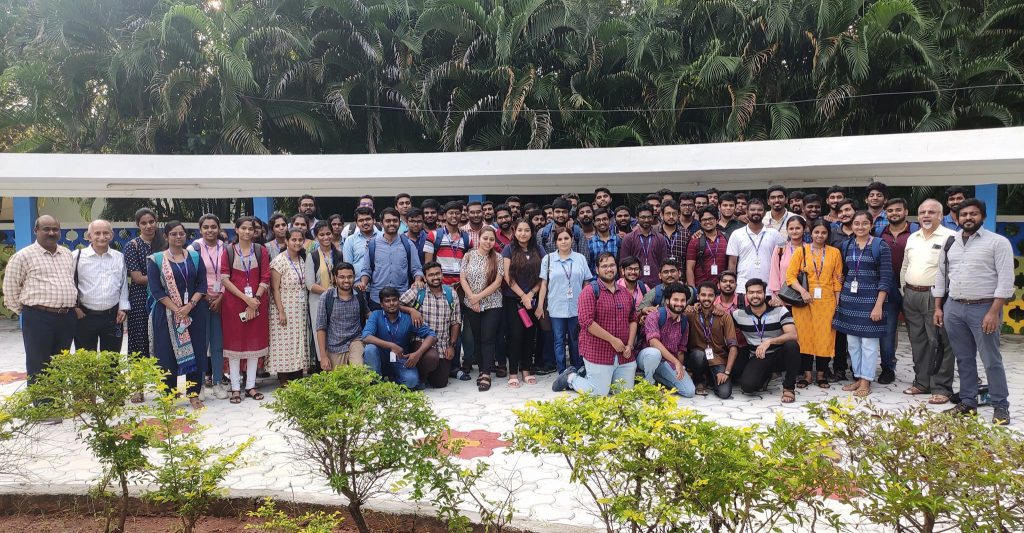Appreciative Inquiry will be of value for facilitating the large system/whole system change; Persons in social, educational, or corporate sectors who are facilitators of effectiveness in the system (organization or team); HRD and OD professionals who wish to expand their canvas of competence and pursue their professional development; Leaders and Entrepreneurs who
intend to build and facilitate positive energy and culture in their organizations/ Institutions.
Address Internal and Interpersonal Conflicts through Appreciative Inquiry (AI) and Neuro Linguistic Programming (NLP)



By NV Paulose with Sir VM Ramalingam and Dr. Ruksana Hassan
Appreciative Inquiry encourages us heavily to shift our focus from problems to possibilities, while NLP provides tools to reframe and anchor positive emotional states. An unconditional approach towards resolving the issues once for all is the true requirement to get the issues resolved.
- Resolve personal issues effectively to build healthier organizations!

Conflicts, both internal and interpersonal, are a natural part of human life. But, when these conflicts stem from unresolved emotional issues, they can cause significant challenges for individuals, families, and even institutions. People are aware of the issues but are not able to address it within themselves.
When issues are deep rooted and things are not getting resolved with your efforts, it is essential to adopt constructive approaches, such as Appreciative Inquiry and Neuro-Linguistic Programming (NLP) to resolve them once for all.
Appreciative Inquiry (AI) and Neuro Linguistic Programming (NLP) are time tested methods for organisational development and individual transformation respectively. When these are combined appropriately, it will help you to build healthier organizations and resolve personal issues effectively.
Leaving the issues unresolved only will make it worse and take away all the happiness of the good things that are happening all around. Take a small step now and prolong it through the day to identify the strength of individuals, individually and collectively, and to document them in a format visible and appreciable.
The Power of Recognition and Documentation

One of the powerful transformative steps in resolving conflicts is identifying and celebrating strengths of the people, both individually and collectively. This single step when done without directives and prejudices will change the entire climate in your system. Working with Vruddhi Institute, Bangalore will help you to club Appreciative Inquiry and Neuro Linguistic Programming in this process.
Appreciative Inquiry encourages us heavily to shift our focus from problems to possibilities, while NLP provides tools to reframe and anchor positive emotional states. By dedicating time to observe and document these strengths, individuals and organizations create a visual map of resilience and potential.
Such documentation serves as a reference point, inspiring consistent efforts to maintain positive momentum. Whether it’s a personal journal, a family gratitude board, or an organizational vision document, the act of capturing strengths builds confidence, reinforces collaboration, and lays foundation for sustainable change.
An unconditional approach towards resolving the issues once for all is the true requirement to get the issues resolved. Proposing about how to do the process is an interference into the process. Hence, limit yourself not to influence the flow of the process and focus on the outcome that you are seeking from the process.
Understanding the Root Causes of Conflicts

Internal and interpersonal conflicts often have their roots in early childhood experiences. During formative years, the mind is particularly vulnerable, and the events, relationships, and emotions encountered during this time can leave lasting imprints. These experiences shape how individuals perceive themselves, others, and the world around them. What happens in the childhood lay the foundation for emotional responses and behavior patterns even in their adulthood.
Here are the four primary causes of such conflicts, explained in greater detail:
Fear: Fear often stems from early encounters with danger, failure, or rejection. For instance, a child who grows up in an environment of unpredictability or harsh criticism may internalize a sense of impending threat or insecurity.
This could manifest later in life as avoidance behaviors, over-cautiousness, or difficulty trusting others. Fear acts as a protective mechanism.
Frustration: Frustration arises when individuals perceive barriers to achieving their goals, desires, or expectations. A child who consistently faces unfulfilled needs for attention, validation, or resources may develop feelings of helplessness or resentment. In adulthood, this can turn into different forms.
Impatience, chronic dissatisfaction or difficulty adapting to setbacks are common forms of its reflections. Frustration often fuels conflicts, as individuals project their unresolved emotions onto others. The blame game take us nowhere.
Anger; Anger is an emotional reaction to perceived injustice, mistreatment, or unmet expectations. It often stems from childhood experiences, such as feeling ignored, unfairly treated, or excluded. Anger is an energy in wrong direction.
Anger has a potential for positive transformation when addressed thoughtfully and resolved cheerfully. Resolved feelings can lead to greater self-awareness, resilience, and a deeper understanding of personal potential.
By channelling anger fruitfully, individuals can become advocates for fairness, organisational justice and improved relationships. Anger becomes a catalyst to turn challenges into opportunities for personal and interpersonal development.
Anxiety; Anxiety often originates from uncertainty and unpredictability during childhood. A child who grows up in a chaotic or overly critical environment may develop a persistent sense of worry or unease. This anxiety can become deeply ingrained, influencing how we perceive and respond to future uncertainties.
In adulthood, it may manifest as chronic overthinking, avoidance of challenges, or an inability to stay present in the moment. The child manifest on and often.

By understanding the root causes, individuals can gain clarity on their emotional triggers and begin the process of addressing and resolving their conflicts. While many individuals naturally overcome these issues with time, life experiences, or guidance from teachers, parents, and mentors, others may carry these unresolved emotions into adulthood. When left unaddressed, these emotions can manifest as habits or behaviours that disrupt personal and professional relationships.
Additional Root Causes of Conflicts
Apart from the four primary causes, other contributing factors include:
- Insecurity: A lack of confidence in oneself or one’s relationships.
- Low Self-Esteem: Negative self-perception, self-doubt, and a lack of belief in one’s abilities.
- Unresolved Grief: Emotions related to unprocessed loss, trauma, or major life changes.
- Lack of Boundaries: Poorly defined personal boundaries in relationships, leading to misunderstandings and emotional strain.
The Consequences of Unresolved Conflicts
When conflicts are ignored, they can escalate, causing harm not only to the individual but also to their family, colleagues, and community. Individuals suffering from these unresolved issues may develop maladaptive coping mechanisms such as:
- Substance abuse.
- Aggression or withdrawal.
- Emotional manipulation or avoidance.
These behaviours can damage relationships, harm reputations, and impede personal and professional growth. Additionally, the presence of unresolved conflicts often leads to a phenomenon known as secondary gain.
Understanding Secondary Gain

Secondary gain occurs when individuals instinctively maintain negative emotions or behaviours because of the perceived benefits they bring. For example:
- Anger: Used to assert control or manipulate others.
- Anxiety: A means of avoiding responsibility by garnering sympathy.
While these behaviors may offer short-term benefits, they ultimately reinforce the underlying issues, preventing individuals from achieving lasting resolution.
The Role of Appreciative Inquiry
Appreciative Inquiry is a strength-based approach to problem-solving that focuses on identifying and building upon what works well. By emphasizing positivity and collaboration, it can:
- Foster a constructive environment for families and organizations.
- Encourage individuals to recognize and leverage their strengths.
- Shift focus from problems to opportunities, promoting sustainable growth.
How NLP Therapy Can Help
Neuro-Linguistic Programming (NLP) offers practical and effective methods to address the root causes of conflicts. By using NLP techniques, individuals can:
- Gain awareness of their negative thought patterns.
- Reframe their emotional responses.
- Develop healthier coping strategies.
NLP Techniques for Resolving Conflicts
Here are some powerful NLP techniques that help individuals overcome fear, frustration, anger, anxiety, and related issues:
- Reframing: Changing the interpretation of a situation to reduce negative emotions and foster positivity.
Example: Viewing a challenging task as an opportunity to grow rather than a burden.
- Anchoring: Associating positive emotions or states with specific triggers to replace negative responses.
Example: Using a calming gesture or thought to counteract anxiety during stressful situations.
- Visual-Kinesthetic Dissociation (VKD): Detaching from negative emotions by reimagining past events from a neutral perspective.
Example: Watching a past traumatic event as if it were a movie, reducing its emotional impact.
- Meta-Modeling: Asking clarifying questions to challenge and reshape negative thought patterns.
Example: Replacing the belief “I always fail” with “What can I learn to improve next time?”
- Parts Integration: Harmonizing conflicting internal “parts” or desires to promote inner balance.
Example: Aligning the part that seeks independence with the part that values connection.
- Time Line Therapy: Releasing negative emotions associated with past events to reduce their influence on present behavior.
Example: Letting go of unresolved anger from childhood to improve current relationships.
Moving Toward Resolution and Growth
By addressing the root causes of conflicts using Appreciative Inquiry and NLP techniques, individuals can:
- Break free from the cycle of negative emotions and secondary gain.
- Enhance their emotional intelligence and resilience.
- Build stronger, healthier relationships.
- Achieve personal and professional growth.
Families and institutions play a crucial role in supporting individuals through this journey. By adopting Appreciative Inquiry as a regular practice and introducing NLP therapy where needed, we can create environments that foster healing, harmony, and growth. These holistic steps resolve conflicts and contribute deeply to the well-being of individuals, families, organisations and society at large.





